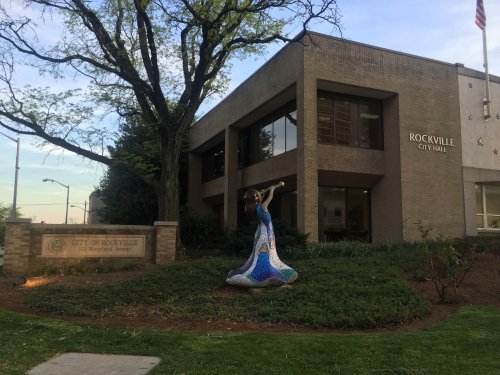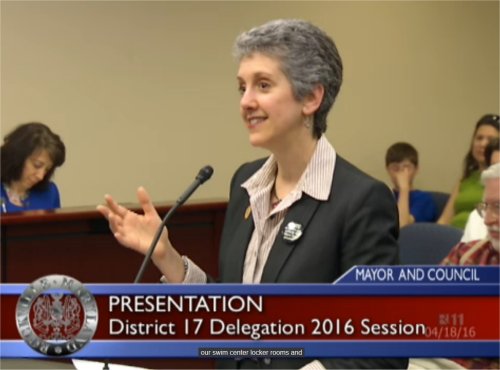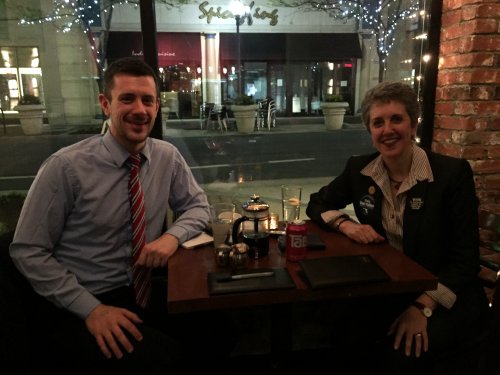ROCKVILLE, MARYLAND
APRIL 18, 2016
STRANGER: Cheryl Kagan
LOCATION: Ev & Maddy’s, 101 Gibbs Street, Rockville, Maryland
THEME: Supper with a state senator
Self-confessed Scrabble addict Cheryl Kagan would like nothing better than some downtime playing a word game, fixing up her house, listening to folk music, or maybe going on a date.
But that all has to wait while she’s serving as a Maryland state senator.
She’s a Democrat representing district 17, covering the large cities of Rockville and Gaithersburg. Although she stressed many times during our dinner interview that she’s honored to serve her constituents, she said the impact on her private life has been total. Goodbye to privacy, as she fields calls and emails around the clock on everything from the economy to the environment.

We met one night at Rockville City Hall, where she and other Maryland lawmakers were debriefing the council on the latest state legislative session. Every January through April the state House of Delegates and Senate convene to consider thousands of bills. Cheryl had seen some victories and some losses, and appeared earnest and energetic as she debriefed from a podium.
Afterward, she greeted me warmly — a can of her favorite soda and energy boost Tab in hand. She was wearing a well-tailored suit over a red-and-white striped open-necked shirt, with a button on her lapel saying “Vote! Or you’ve got nobody to blame but yourself.” Cheryl was wearing the button because she’d been out in the city that day promoting Early Voting.
But we didn’t get to talk much because several people came running up to Cheryl, eager to talk about a bill or community project. I watched, impressed as the senator without assistance engaged these people by their first names, reminiscing about past meetings.
Eventually the greetings were over and we headed out of City Hall toward dinner — and straight into a reporter from a local newspaper. She quizzed Cheryl about the debriefing. Although I’m a reporter for my day job, I was off the clock and stood back as the senator took her time in answering, waiting patiently till the journalist had run out of questions.
On the way to the restaurant, Cheryl gave me a tour of Rockville including a divisive Civil War statute that has been partially shielded from public view; the beautiful library; and numerous buildings, with a personal story for each one. For dinner, however, she decided we should eat somewhere new, and that’s how we ended up at the bistro Ev & Maddy’s.

The roomy venue is dimly lit, which I mention because it made it hard to read the menu even in a window seat. But it’s tastefully decorated. High ceilings, and one large wall of exposed brick dotted with some small artwork, and a cherry-red wall leading to the bar in the back.
“It’s a good menu,” I said.
“From what I can read of it!” said Cheryl with a laugh.
We squinted and figured out some pre-dinner cocktails — for her, a French martini, which included Chambord, vodka and pineapple juice. “This tastes like Florida to me,” she said with a smile. “It’s good. A little too good, I could probably chug two or three of these back.”
I sipped at a French ’75 — a light and refreshing mix of gin, Champagne, lemon juice, and sugar — while Cheryl told me tonight was rare as she had no plans except our dinner.
“The theory is that now the Maryland legislature is out of session, I have more free time,” she said. During the 90-day sessions at the state’s capital in Annapolis, Cheryl and other lawmakers have to live in hotels, holding late-night meetings in restaurants and bars as they network and try to win over supporters for the vast array of bills being debated. All bills have to be approved by midnight on the last day of the session to be sent to the governor for his signature or veto.
For this year’s session, Cheryl had some victories including a bill to require state agencies to modify their monolingual websites to include other languages for the state’s growing number of residents who aren’t proficient in English. But there were disappointments, and at the city council meeting she lamented the defeat of a bill she supported to allow rape survivors to prevent their attackers from having parental rights to children conceived during rapes. A mixed bag, but she remains optimistic.

“Being a senator gives me an opportunity to make a difference on the issues that I care about,” she said. For the rest of the year she’ll be laying the groundwork for the 2017 legislative session and hoping for yet more success with her bills. But she’ll also be doing constituent services, helping out whenever anyone has a problem; touring businesses; teaching at schools in her district; and more.
“We’re welcoming, it’s a place where people can thrive, our schools are excellent, our roads, transit, arts and humanities — there’s a lot we have here that makes it a wonderful place to raise a family so people have flocked here from all over the world,” she said as our waitress returned.
Cheryl engaged with our server Emily, quizzing her about working at the restaurant and introducing herself as the district’s senator. From the few interactions I saw that night, it’s clear Cheryl has a knack for engaging people and keeping the conversation flowing.
Emily took our orders then gave us some small slices of bread with olive oil to snack on. I couldn’t figure out whether the bread was homemade or not, but the small portion meant it wasn’t much of a concern. I chewed on it as Cheryl continued to promote her district.

She called it a “high tech corridor” with information, biotech and other industries making up a large part of the employment base, as well as a large number of government jobs. The district of roughly 130,000 people has “everything from affluent educated upper income folks to new residents who don’t speak English with a lot of people sharing one apartment trying to make ends meet, and everything in-between,” she said. “I love that. It creates opportunities to learn from one another.”
The high number of foreign-language speakers in her district was the impetus behind the bill that mandated state agencies adapt their sites to make them multi-lingual. Cheryl had noticed that 83 percent of the agencies’ sites were monolingual. “I thought that wasn’t okay in our increasingly diverse state,” she said. Other members of the legislature objected, fearing massive costs to pay translators to make the sites multi-lingual. Eventually she saw one website that used a Google Translate plug-in to provide multiple languages. “That’s when the light bulb went off,” she said. In lieu of expensive translating, she pitched a bill requiring use of similar widgets on other agencies’ websites with a disclaimer that the state is not liable for bad translations — a cost-saving solution.
“It was important for me to get this bill through because our district is so diverse,” said Cheryl, noting that three percent of residents statewide speak Spanish and a further one percent Chinese.
She often attends events around the district, saying it gives her “ideas and connections.” She loves speaking at schools because she attended public school in the area from kindergarten through 12th grade. She remembers largely white schools that now have students “from every corner of the world. I love that I get to see that up close when I go to these schools and talk to the kids.”

Cheryl didn’t always want a job in politics.
She grew up in Maryland and was involved in school government, such as planning homecoming events. In her freshman year at Vassar College she took a class in American politics. “I’d always thought of myself as a moderate because I was for peace, justice, equality and a clean environment, that was just common sense,” she said. “But I learned that made me a liberal. And if I was a liberal I thought I should put my money where my mouth is.”
In 1980 she traveled to Washington, DC, and volunteered for Ted Kennedy’s ultimately unsuccessful Democratic presidential primary campaign. “I was 18 at the time and on the convention floor when I heard his speech, it was just so thrilling to be there,” she said.
Nevertheless, her plan after was to major in foreign languages and be an interpreter at the United Nations. She tried a bunch of non-political courses but kept coming back to politics, finally becoming a political science major. She wanted an “A-plus” resume for this career, so volunteered for two campaigns and spent a semester in the District working for a House subcommittee. On campus, she launched Vassar’s chapter of the Americans for Democratic Action. “By the time I graduated I had a lot of political experience,” she said.
Her first job out of school was a three-month paid position at the Brookings Institution, a Washington-based think tank. Then she worked for the failed presidential campaign of the late California Democratic Senator Alan Cranston. “You remember President Cranston, right?” she laughed ironically. Other jobs included political consulting and more campaigns.

Before Cheryl could continue, Emily returned with our starters.
My French onion soup au gratin was served with a massive wedge of bread and just the right amount of cheese — not too much that the bowl became a huge glob of fromage, not too little to make it all liquid, with a hint of lashings of red wine in the stock.

Cheryl chose the seafood appetizer of four scallops in a butterscotch vinaigrette. After singing the praises of her dish, Cheryl said that she was wary of a political career.
She was nervous about how invasive and time-consuming such a career might be. After demurring, she changed her mind when reading the newspaper and being outraged by something. “I thought that somebody ought to do something about it. And then I realized that if I got elected, I could do something about it, and work on the issues that matter in people’s lives.”
She ran for a Maryland House of Delegates term that began in 1995, competing in a crowded 10-year race for three seats. Two incumbents were running and there was a vacant slot. “To win I knew I had to out-hustle and out-doorknock everyone else,” Cheryl said. It worked. She was elected to the seat and served in the House until 2003, when she decided to step down.
During her time out of politics she worked on many different things, including as the first executive director of the Carl M. Freeman Foundation that provided more than $1 million each year to nonprofit organizations primarily located within the DC metro area.

Things changed in 2012 and 2013 when calls started urging her to run for the Senate. Cheryl’s successor in the House was planning to run for the open primary for the upper chamber in 2014, but she started to receive calls urging her to be a candidate. “It took me eight months to decide to run,” she said. “I felt like I had put that all in the past and moved on. It’s hard to be public again, give up your nights and weekends, ask everyone you’ve ever known for money and time. It’s exhausting.”
Then she smiled. “But it’s energizing too,” she said, and once she was out on the campaign trail relished the chance to meet voters and draw distinctions with her opponent — saying, for example, that he was bad on some issues, like opposing the bill on paternal rights for rape victims. Her campaign also cited articles in the Washington Post and Baltimore Sun faulting her opponent.
Once the primary ballots were counted, Cheryl won. Winning the primary was a de facto election to the Senate in November given the huge majority Democrats have in her district, so she spent that summer building relationships with other senators. “I had this weird experience of people coming up to me and wanting to hug me ’cause they wouldn’t have to work with my opponent,” she laughed.
When Cheryl worked in the House it was under a Democratic governor. Now, as state senator, she works under Republican Governor Larry Hogan. “It’s very different,” she said. “Under a Democratic governor, whether we agree or disagree on an issue, at least we’re in the same family of progressive ideals. With Hogan — he’s a nice man, but his values are Republican values.” Nevertheless, she’s been trying to find common ground with the GOP.

Cheryl was one of only two Democratic Maryland state lawmakers to attend Hogan’s inaugural ball, which she did as a sign of her willingness to work in a bipartisan manner. “There’s a lot we don’t agree on, but I told the governor I will work together whenever we can,” she said.
That means she can have close friends in the upper chamber who are conservatives that she can work with to move some bills and fight them on others, but still stay amicable. Unlike the House and its 141 members, the Senate only has 47 members “so it’s too small to have enemies,” she said.
Nevertheless, she does have some opponents — including members of the public.
“People feel they have a right to hector you, to criticize you, holding you up to totally unrealistic standards and getting into your personal life,” she said. Some of her critics think she takes limousines everywhere and lives the high life, but that couldn’t be further from the truth. She earns $43,000 a year and is thinking of getting a second job to help pay her mortgage. “I think some voters just assume we have big salaries and expense accounts and nothing could be further from the truth,” Cheryl said. “But it’s a privilege and honor and I work hard, so it’s not a burden.”
Sometimes she’s been disappointed by “petty politics” stalling some legislation, but largely remains hopeful about her ability to use her position to advance the interests of her district.

So how does a senator relax if she can ever find any free time?
Getting dinner with a stranger was one option — and I’m glad she suggested doing so at Ev & Maddy’s, because the entrees were as well prepared as our tremendous starters.

Cheryl had the maple-glazed duck breast with duck confit hash and pomegranate sauce. After sampling a small piece of the dish, I back her assessment that it was “very good.”

My order was a thick slab of perfectly cooked fresh cod, wrapped in prosciutto giving it a perfectly salty edge. The spicy curry gave the overall dish a nice kick, enhanced by the fluffy forkfuls of rice.
While we ate, Cheryl said folk music is a huge hobby. She became a fan after attending a political fundraiser in the 1980s where a folk band performed. She even met her now ex-husband at a folk concert, asking him for a date because he was too shy to ask.
Eventually the duo decided to give back to the community by hosting folk concerts bringing singer-songwriters to Rockville. They started out in 2003 hosting performers in their basement with about 70 t0 75 guests, and the semi-regular events have continued in ever-larger venues. “They’re just so fun and it’s a great way for the performers to make some money,” she said.
Cheryl’s also a huge Scrabble fan and is ranked in national competitions. “I’m a grammar geek, a word nerd, and I’m proud of it. A friend of mine got me a t-shirt shirt last year saying, ‘I’m silently correcting your grammar,’” she said, bursting into laughter. But it’s not just a hobby, she’s also brought several Scrabble competitions to Rockville as “a tiny bit of economic development.”
The senator, who is single, would also like to get back into dating but notes that her job makes the romantic world a perilous one. “You could be a fat man with a greasy comb-over and somehow sexy because you’re a senator. Because I’m a woman, some men are intimidated,” she said.
There are concerns about a date being seen as a conflict if the person has any connection to a particular lobbying organization, she noted. One of her former boyfriends — from the mid-1990s before her marriage — was a lobbyist and the couple had to fill out expense forms for everything from dinners to trips to the movies. “I’m still trying to figure out how to navigate dating as a senator,” she said. “My joke is that I like candlelit dinners, long walks on the beach, and policymaking,” she added with a laugh.

Although Cheryl’s workload doesn’t give her a lot of free personal time, she doesn’t mind. “Being just one of 47 senators, my voice is now three times as loud as when I was one of 141 delegates in the House. So people will listen if I have something to say,” she said.
Unlike some of her colleagues — who plot out their futures including exactly how long they’ll serve in the Senate before running for governor or another position — she has no long-term plans. “It just seems really presumptuous. And the problem with a long term plan is that any one vote can kill your trajectory. There’s the potential for looking over your shoulder with every vote.”
Cheryl shrugged as she said, “Every time I cast a vote, I know that I could be ticking someone off.” But she reiterated that her votes are targeted at whatever she thinks is best for her district.
As our dinner came to an end, Cheryl smiled and said, “It’s a fun, ever-changing, and busy life, and I’m lucky to get to work with interesting and dedicated people every day as I seek to make a difference.”